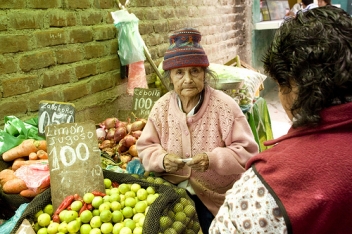 On 7 October, millions of workers across the globe will be uniting to celebrate the World Day for Decent Work.
On 7 October, millions of workers across the globe will be uniting to celebrate the World Day for Decent Work.
It’s a key moment. The financial crisis has decimated jobs and economies and social unrest is rising. Leaders the world over are realising the old economic models aren’t working and that jobs and decent work must be central to growth from now on.
All well and good. Yet there is another critical issue which is being ignored by world leaders. Despite unprecedented population ageing that will see a doubling of the world’s older population in the next 40 years [1] no one is talking about older workers.
Why is this? Popular myth has it that older people do not work and that they can rely on a pension or their family to take care of them in older age.
Yet the reality is that, unlike their counterparts in regions such as Europe or North America, older people in low- and middle- income countries continue working in to their 60s, 70s, and even 80s, in subhuman and degrading conditions until frailty or illness force them to stop.
Older people work to support themselves and their grandchildren
They are working not only to support themselves but increasingly they are the main carers for grandchildren where parents are absent due to migration, urbanisation and HIV and AIDS.
Even older people who have been fortunate enough to work in the formal economy find themselves pushed into informality when age-discriminatory legislation and practice forces them to retire.
We ignore older workers at our peril. Today’s workers are tomorrow’s older workers and we all need to act now to make sure working people the world over – including ourselves – can look forward to an older age of dignity and security.
What needs to be done? Work is an integral part of social and cultural development. Older workers who have to continue working or who want to should be supported by labour policies which promote flexible working conditions, and access to decent work [2] and social protection which recognises the specific needs of older workers.
Including older workers in decent work policy and programmes is vital if governments are to achieve social justice and democracy.
Secondly, older workers access to decent work is an investment in younger generations. Older people the world over spend their income on their families, investing in children’s education, health, family nutrition and livelihoods. If we want to break the intergenerational transmission of poverty, we have to invest in older people.
Older workers must be included in decent work policy and programmes
In previous years, the World Day for Decent Work has involved action by millions of trade unionists and workers associations.
We call on the global movement for Decent Work to include vulnerable and chronically poor workers of all ages in their dialogue with governments and businesses.
We want them to extend membership and campaigns to older workers, in both the informal and formal economies. An investment in older people today is an investment in all of us for tomorrow.
